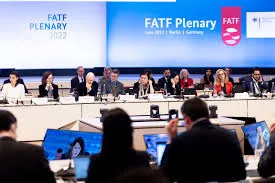
Economic Impacts of Gray Listing
The International Monetary Fund (IMF) estimates that countries on the FATF Gray List are at risk of substantial economic downturns. Vietnam, added to the Enhanced Monitoring List (Gray List) in June 2023, faces potential reductions in GDP, foreign direct investment (FDI), and other capital flows. To address this, Deputy Prime Minister Lê Minh Khái chaired a meeting in October 2023 to expedite measures for Vietnam's removal from the Gray List within two years.
Deputy Governor of the State Bank, Phạm Tiến Dũng, highlighted FATF's inclusion of Vietnam in the list of countries with significant virtual asset activities. As part of the removal process, Vietnam must prioritize the implementation of a legal framework addressing money laundering related to virtual assets. This includes the urgent need to define virtual assets (VA) and virtual asset service providers (VASP) to enable effective state management and business operations.
Exiting the Gray List hinges on Vietnam's commitment to strengthening regulations and mechanisms targeting digital and virtual currency transactions. A crucial step involves enacting clear definitions of virtual assets and service providers, providing government agencies and businesses with the necessary framework for compliance with the law.
Vietnam's determination to swiftly exit the FATF Gray List underscores the critical role of legislation in addressing cryptocurrency-related challenges. By prioritizing the definition and regulation of virtual assets and service providers, the country aims to enhance state management, combat money laundering, and create a secure and compliant business environment. As the deadline approaches, Vietnam's focus on legislative imperatives signals a proactive approach to safeguarding its economic interests.
Unveiling Risks and the Call for Regulation
As the cryptocurrency landscape evolves, the risks associated with virtual asset service providers (VASPs) are becoming more intricate, especially concerning money laundering. Mr. Trần Dinh, Head of the Fintech Application Department at the Vietnam Blockchain Association (VBA), sheds light on the growing sophistication of criminal tactics in the cryptocurrency realm.
Mr. Dinh categorizes VASPs into various businesses, with centralized cryptocurrency exchanges emerging as the most popular in Vietnam. According to data from CoinMarketCap (CMC), there are currently 226 centralized exchanges (CEX) and nearly 500 decentralized exchanges (DEX) worldwide, collectively handling a staggering daily trading volume of almost USD 58 billion.
In the Vietnamese market, the Wall Street Journal reports that in May 2023 alone, users on Binance, the world's largest centralized exchange, engaged in transactions exceeding USD 20 billion. Other notable exchanges, including HTX (formerly Huobi), MEXC, ByBit, KuCoin, BingX, and Gate.io, also contribute significantly to the market's trading activities.
VASPs share common characteristics, notably a lack of transparency and a heightened vulnerability to hacker attacks. This susceptibility exposes traders to hidden risks, such as personal data theft and the potential freezing of assets by exchanges. The centralized management of services by exchanges, coupled with the absence of state supervision, leaves users unprotected in the event of disputes.
The infamous Mt. Gox incident in February 2014 serves as a stark reminder of the risks associated with centralized exchanges. Hackers attacked Mt. Gox, resulting in the loss of approximately 650,000 Bitcoin (BTC). Despite nearly a decade of searching for justice, investors in Mt. Gox have yet to recover their lost assets due to the absence of specific regulations.
The vulnerabilities and challenges associated with VASPs, particularly centralized exchanges, underscore the critical need for comprehensive regulations. As the cryptocurrency market continues to expand, addressing issues of transparency, security, and investor protection becomes paramount. The Mt. Gox incident serves as a cautionary tale, emphasizing the urgency for regulatory frameworks that safeguard users and mitigate risks in the dynamic world of virtual asset transactions.
Safeguarding Investors and Enhancing Market Transparency
The absence of robust regulations in the virtual currency market poses significant risks, including potential loss of tax revenue, increased susceptibility to money laundering, and damage to Vietnam's reputation. In a bid to swiftly exit the FATF Gray List, Mr. Trần Dinh advocates for transparency, urging Vietnam to identify virtual assets (VA) and virtual asset service providers (VASP) promptly. His recommendations emphasize compliance with existing laws while awaiting the formulation of new regulations.
Drawing from global experiences, Vietnam can learn from regulatory frameworks implemented in other jurisdictions. In the United States, cryptocurrencies have been treated as property since 2014, subjecting transactions to capital gains taxes. The Financial Crimes Enforcement Agency (FinCEN) relied on the Bank Secrecy Act (BSA) to introduce a FATF-aligned rule in 2019. This rule mandates VASPs to collect and exchange information about transaction senders and recipients.
The European Parliament's Cryptocurrency Markets Act (MiCA), passed in April 2023, sets a precedent for protecting investors and improving governance. VASPs under MiCA are obligated to implement measures that safeguard investors and enhance overall governance. Additionally, the legislation expands the entities subject to European Anti-Money Laundering (AML) regulations, slated to take effect by the end of 2024.
The United Arab Emirates (UAE), also on the FATF Gray List, recently took substantial steps toward regulatory compliance. On November 6, the UAE announced comprehensive guidelines for VASPs, introducing civil and criminal penalties for operating without permission. This initiative is regarded as the UAE's latest effort to expedite its removal from the FATF Gray List.
To fortify investor protection and elevate market transparency, Vietnam must proactively identify and manage virtual assets and service providers. Leveraging lessons from international models, such as the US, Europe, and the UAE, can guide Vietnam in formulating effective regulations. The timely adoption of comprehensive measures will not only contribute to the country's swift exit from the Gray List but also bolster confidence in the cryptocurrency market, fostering a secure and well-regulated environment for investors.




















